
Asks Adaobi Rhema Oguejiofor
The Federal Government has remained adamant and insistent that fuel subsidy has been removed, faulting the likes of the Former Kaduna State governor, Nasir El-Rufai, and the Independent Oil Marketers Association of Nigeria over their claims that the subsidy still exists.
Earlier reports reveal that the Minister of State for Petroleum Resources (Oil), Heineken Lokpobiri, while speaking on the issue, stated that those alleging that the Government is providing subsidies for the product should supply evidence and facts to back up their allegations, stressing that the current Administration’s position on fuel subsidies remains unchanged.
In his own words, “I do not want to go deep into that issue. It is a very sensitive issue. We should get all the facts. As far as I am concerned, the President removed the subsidy, and it remains removed till today.
“As for anybody saying that subsidy is being paid, it is left for the person to bring the facts, and then we will talk about them. It may not be determined by market forces, but let us deal with the price as it is today. Every government has a duty to do certain things, not only in the petroleum sector but in several other sectors, to cushion the effect and burden on Nigerians.”
Speaking of facts, in an exclusive interview with Valuechain, an expert in International Petroleum Fiscal Economics and the Geopolitics of Oil and Gas Resources and Supply, Professor Omowumi Illadare, said that in his opinion, insisting that there is no subsidy on petrol is not supported by facts.
He noted that it is understandable if perception on subsidy removal or payment remains speculative between the elites in government and the elites out of government, but facts are facts.
In his words, “statistically, when the price of crude oil goes up, product prices go up too even if not exactly in a proportional manner. The landing cost of Premium Motor Spirits (PMS) to Nigeria has increased relatively compared to when the price was set at N500 by the dominant firm, the Nigerian National Petroleum Company (NNPC) Limited. Also, the price of a dollar to a naira, within the same period, has gone up from where it was only at about N650 per dollar during the ‘subsidy is gone’ drama about a year ago.
“Thus, that there is no subsidy on PMS is not supported by facts. “Perhaps, what remains conjectural is who and what is being paid by who and to whom, especially, if subsidy payment is not a line item in the 2024 appropriation bill. The price of PMS in Ghana is, for example, more than a dollar per litre and so also in Europe, the source of PMS to West Africa.”
Prof. Illedare further highlighted that another fact that should be looked into is the price gap between diesel and PMS in Nigeria as it is an uncommon phenomenon worldwide.
He explained that in most places around the world, the price of PMS and the price of Automative Gas Oil (AGO) move together with only about 10 percent difference or less, but the gap between the two in Nigeria can only be explained through the subsidy mechanism.


